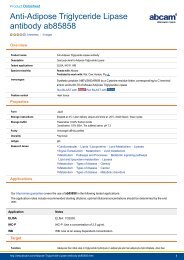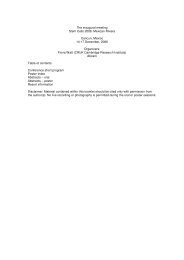Create successful ePaper yourself
Turn your PDF publications into a flip-book with our unique Google optimized e-Paper software.
<strong>Anti</strong>-<strong>PAX3</strong> <strong>antibody</strong> <strong>ab137470</strong> 1<br />
Product Datasheet<br />
Overview<br />
1 Abreviews 4 Images<br />
Product name <strong>Anti</strong>-<strong>PAX3</strong> <strong>antibody</strong><br />
Description Rabbit polyclonal to <strong>PAX3</strong><br />
Tested applications WB, IHC-P, ICC/IF<br />
Cross reactivity Reacts with: Mouse, Human<br />
Immunogen Synthetic peptide, corresponding to a region within amino acids 442-455 of Human <strong>PAX3</strong><br />
(P23760).<br />
LPTSQSYCPPTYST<br />
Run BLAST with Run BLAST with<br />
Positive control A431, H1299, HeLa, Molt-4 and Raji whole cell lysates, HeLa and Mouse ESC D3 cells, SG<br />
xenograft<br />
Properties<br />
Form Liquid<br />
Storage instructions Shipped at 4°C. Store at -20ºC.<br />
Storage buffer pH: 7.00<br />
Preservative: 0.01% Thimerosal (merthiolate)<br />
Constituents: 0.75% Glycine, 1.21% Tris, 10% Glycerol<br />
Purity Immunogen affinity purified<br />
Clonality Polyclonal<br />
Isotype IgG<br />
Research Areas Developmental Biology Organogenesis Nervous system development<br />
Developmental Biology Lineage specification Ectoderm<br />
Transcription Factors<br />
Stem Cells Neural Stem Cells Intracellular<br />
Stem Cells Lineage Markers Ectoderm<br />
Stem Cells Mesenchymal Stem Cells Myogenesis<br />
Stem Cells Neural Stem Cells Neural Crest Stem Cells<br />
Other Factors<br />
Epigenetics and Nuclear Signaling Transcription Domain Families<br />
Developmental Families PAX<br />
Applications<br />
Our Abpromise guarantee covers the use of <strong>ab137470</strong> in the following tested applications.<br />
The application notes include recommended starting dilutions; optimal dilutions/concentrations should be determined by the end user.<br />
Application Notes<br />
WB WB: 1/500 - 1/3000. Predicted molecular weight: 53 kDa.<br />
IHC-P IHC-P: 1/100 - 1/1000. Perform heat mediated antigen retrieval with citrate buffer pH 6 before<br />
http://www.abcam.com/<strong>PAX3</strong>-<strong>antibody</strong>-<strong>ab137470</strong>.html 1
<strong>Anti</strong>-<strong>PAX3</strong> <strong>antibody</strong> <strong>ab137470</strong> 2<br />
Function Probable transcription factor associated with development of alveolar rhabdomyosarcoma.<br />
Involvement in disease Defects in <strong>PAX3</strong> are the cause of Waardenburg syndrome type 1 (WS1) [MIM:193500]. WS1<br />
is an autosomal dominant disorder characterized by wide bridge of nose owing to lateral<br />
displacement of the inner canthus of each eye (dystopia canthorum), pigmentary disturbances<br />
such as frontal white blaze of hair, heterochromia of irides, white eyelashes, leukoderma and<br />
sensorineural deafness. The syndrome shows variable clinical expression and some affected<br />
individuals do not manifest hearing impairment.<br />
Defects in <strong>PAX3</strong> are the cause of Waardenburg syndrome type 3 (WS3) [MIM:148820]; also<br />
known as Klein-Waardenburg syndrome or Waardenburg syndrome with upper limb<br />
anomalies or white forelock with malformations. WS3 is a very rare autosomal dominant<br />
disorder, which shares many of the characteristics of WS1. Patients additionally present with<br />
musculoskeletal abnormalities.<br />
Defects in <strong>PAX3</strong> are the cause of craniofacial-deafness-hand syndrome (CDHS)<br />
[MIM:122880]. CDHS is thought to be an autosomal dominant disease which comprises<br />
absence or hypoplasia of the nasal bones, hypoplastic maxilla, small and short nose with thin<br />
nares, limited movement of the wrist, short palpebral fissures, ulnar deviation of the fingers,<br />
hypertelorism and profound sensory-neural deafness.<br />
Defects in <strong>PAX3</strong> are a cause of rhabdomyosarcoma type 2 (RMS2) [MIM:268220]. It is a form<br />
of rhabdomyosarcoma, a highly malignant tumor of striated muscle derived from primitive<br />
mesenchimal cells and exhibiting differentiation along rhabdomyoblastic lines.<br />
Rhabdomyosarcoma is one of the most frequently occurring soft tissue sarcomas and the<br />
most common in children. It occurs in four forms: alveolar, pleomorphic, embryonal and<br />
botryoidal rhabdomyosarcomas. Note=A chromosomal aberration involving <strong>PAX3</strong> is found in<br />
rhabdomyosarcoma. Translocation (2;13)(q35;q14) with FOXO1. The resulting protein is a<br />
transcriptional activator.<br />
Note=A chromosomal aberration involving <strong>PAX3</strong> is a cause of rhabdomyosarcoma.<br />
Translocation t(2;2)(q35;p23) with NCOA1 generates the NCOA1-<strong>PAX3</strong> oncogene consisting<br />
of the N-terminus part of <strong>PAX3</strong> and the C-terminus part of NCOA1. The fusion protein acts as<br />
a transcriptional activator. Rhabdomyosarcoma is the most common soft tissue carcinoma in<br />
childhood, representing 5-8% of all malignancies in children.<br />
Sequence similarities Belongs to the paired homeobox family.<br />
Contains 1 homeobox DNA-binding domain.<br />
Contains 1 paired domain.<br />
Cellular localization Nucleus.<br />
commencing with IHC staining protocol.<br />
ICC/IF ICC/IF: 1/100 - 1/1000.<br />
Target<br />
Target information above from: UniProt accession P23760 The UniProt Consortium<br />
The Universal Protein Resource (UniProt) in 2010<br />
Nucleic Acids Res. 38:D142-D148 (2010) .<br />
Database links Entrez Gene: 5077 Human<br />
Entrez Gene: 5077 Human<br />
Entrez Gene: 18505 Mouse<br />
Omim: 606597 Human<br />
SwissProt: P23760 Human<br />
SwissProt: P23760 Human<br />
SwissProt: P24610 Mouse<br />
Unigene: 42146 Human<br />
http://www.abcam.com/<strong>PAX3</strong>-<strong>antibody</strong>-<strong>ab137470</strong>.html 2
<strong>Anti</strong>-<strong>PAX3</strong> <strong>antibody</strong> <strong>ab137470</strong> 3<br />
Alternative names<br />
<strong>Anti</strong>-<strong>PAX3</strong> <strong>antibody</strong> images<br />
Western blot - <strong>Anti</strong>-<strong>PAX3</strong> <strong>antibody</strong><br />
(<strong>ab137470</strong>)<br />
Unigene: 1371 Mouse<br />
CDHS <strong>antibody</strong><br />
HUP 2 <strong>antibody</strong><br />
HUP2 <strong>antibody</strong><br />
MGC120381 <strong>antibody</strong><br />
MGC120382 <strong>antibody</strong><br />
MGC120383 <strong>antibody</strong><br />
MGC120384 <strong>antibody</strong><br />
MGC134778 <strong>antibody</strong><br />
Paired box 3 <strong>antibody</strong><br />
Paired box gene 3 <strong>antibody</strong><br />
Paired box homeotic gene 3 <strong>antibody</strong><br />
Paired box protein Pax 3 <strong>antibody</strong><br />
Paired box protein Pax-3 <strong>antibody</strong><br />
Paired box protein Pax3 <strong>antibody</strong><br />
Paired domain gene 3 <strong>antibody</strong><br />
Paired domain gene HuP2 <strong>antibody</strong><br />
PAX 3 <strong>antibody</strong><br />
Pax3 <strong>antibody</strong><br />
<strong>PAX3</strong>/FKHR fusion gene <strong>antibody</strong><br />
<strong>PAX3</strong>_HUMAN <strong>antibody</strong><br />
Waardenburg syndrome 1 <strong>antibody</strong><br />
WS 1 <strong>antibody</strong><br />
WS1 <strong>antibody</strong><br />
WS3 <strong>antibody</strong><br />
<strong>Anti</strong>-<strong>PAX3</strong> <strong>antibody</strong> (<strong>ab137470</strong>) at 1/1000<br />
dilution + A431 whole cell lysate at 30 µg<br />
Predicted band size : 53 kDa<br />
7.5% SDS PAGE<br />
http://www.abcam.com/<strong>PAX3</strong>-<strong>antibody</strong>-<strong>ab137470</strong>.html 3
<strong>Anti</strong>-<strong>PAX3</strong> <strong>antibody</strong> <strong>ab137470</strong> 4<br />
Immunocytochemistry/<br />
Immunofluorescence - <strong>Anti</strong>-<strong>PAX3</strong><br />
<strong>antibody</strong> (<strong>ab137470</strong>)<br />
Immunocytochemistry/<br />
Immunofluorescence - <strong>Anti</strong>-<strong>PAX3</strong><br />
<strong>antibody</strong> (<strong>ab137470</strong>)<br />
Immunohistochemistry (Formalin/PFAfixed<br />
paraffin-embedded sections) - <strong>Anti</strong>-<br />
<strong>PAX3</strong> <strong>antibody</strong> (<strong>ab137470</strong>)<br />
Immunofluorescent analysis of<br />
paraformaldehyde-fixed HeLa cells labelling<br />
<strong>PAX3</strong> with <strong>ab137470</strong> at 1/200 dilution.<br />
Picture at the bottom merged with DNA<br />
probe.<br />
Immunofluorescent analysis of<br />
paraformaldehyde-fixed HeLa cells labelling<br />
<strong>PAX3</strong> with <strong>ab137470</strong> at 1/200 dilution.<br />
Picture at the bottom costained with Hoechst<br />
33342.<br />
Immunohistochemical analysis of paraffin<br />
embedded SG xenograft labelling <strong>PAX3</strong> with<br />
<strong>ab137470</strong> <strong>antibody</strong> at a dilution of 1/100.<br />
http://www.abcam.com/<strong>PAX3</strong>-<strong>antibody</strong>-<strong>ab137470</strong>.html 4
<strong>Anti</strong>-<strong>PAX3</strong> <strong>antibody</strong> <strong>ab137470</strong> 5<br />
Our Abpromise to you: Quality guaranteed and expert technical support<br />
As standard<br />
Replacement or refund for products not performing as stated on the datasheet<br />
Valid for 6 months from date of delivery**<br />
Response to your inquiry within 24 hours<br />
In addition<br />
We provide support in Chinese, English, French, German, Japanese and Spanish<br />
Extensive multi-media technical resources to help you<br />
We investigate all quality concerns to ensure our products perform to the highest standards<br />
If the product does not perform as described on this datasheet, we will offer a refund or replacement. For full details of the Abpromise,<br />
please visit http://www.abcam.com/abpromise or contact our technical team.<br />
Terms and conditions<br />
Guarantee only valid for products bought direct from <strong>Abcam</strong> or one of our authorized distributors<br />
**Regional variations to our Abpromise may apply to the following countries: China, Korea, Singapore, Malaysia, Taiwan and Thailand,<br />
which operate a 120 day guarantee. Please contact your regional office for further details<br />
<strong>Anti</strong>bodies tested only in recombinant samples are not covered for use on endogenous samples. Please check the datasheet for<br />
information on tested species<br />
"Predicted to react" information on datasheets is based on sequence homology and provided for reference only<br />
"Predicted to react" species are not guaranteed, as they have not been tested<br />
Fast Track products are not covered under the Abpromise. Please see Fast Track terms and condition for additional information<br />
<strong>Abcam</strong> biochemicals are novel compounds and we have not tested their biological activity in house. Please use the literature to identify<br />
how to use these products effectively. If you require further assistance please contact the scientific support team<br />
UK office<br />
<strong>Abcam</strong> plc<br />
330 Cambridge Science Park Cambridge CB4 0FL UK<br />
Tel: +44 (0)1223 696000<br />
Fax: +44 (0)1223 215 215<br />
Email: orders@abcam.com<br />
US Office<br />
<strong>Abcam</strong> Inc.<br />
1 Kendall Square, Suite B2304 Cambridge,<br />
MA 02139-1517 USA<br />
Tel: (888) 77-ABCAM(22226)<br />
Fax: (877) 774-8286<br />
These numbers are toll free in the US/Canada<br />
Email: us.orders@abcam.com<br />
Visit us at: www.abcam.com<br />
http://www.abcam.com/<strong>PAX3</strong>-<strong>antibody</strong>-<strong>ab137470</strong>.html 5









![Anti-Vinculin antibody [hVIN-1] (ab11194) - Abcam](https://img.yumpu.com/18933715/1/184x260/anti-vinculin-antibody-hvin-1-ab11194-abcam.jpg?quality=85)






